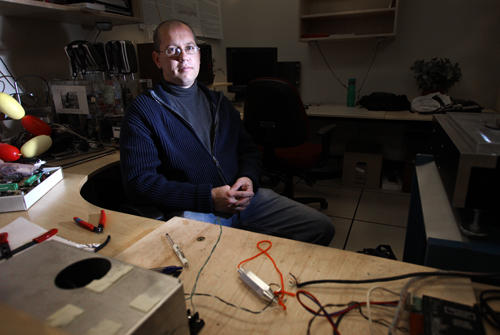Joshua Booren’s daughter was born with a rare chromosomal disorder: Trisomy 5p. “It affects the body from head to foot, including a severe mental disability,” Booren said. “When she was born, the doctors gave her a prognosis of one year,” he continued. “She is now nine years old and a wonderful part of our family.”
PSU alumnus receives national graduate research program fellowship

Joshua Booren’s daughter was born with a rare chromosomal disorder: Trisomy 5p. “It affects the body from head to foot, including a severe mental disability,” Booren said. “When she was born, the doctors gave her a prognosis of one year,” he continued. “She is now nine years old and a wonderful part of our family.”
In helping to manage her condition, Booren worked in collaboration with his daughter’s medical team to help find ways to improve some of her necessary medical equipment. He realized he wanted to return to school and pursue a degree in engineering with the hope that he would be able to help others with physical and mental disabilities. Booren graduated from Portland State in winter 2012 with a degree in mechanical and materials engineering.
Now, less than two months after his graduation, Booren is a recipient of a National Science Foundation Graduate Research Program Fellowship. The fellowship program is the oldest of its kind, according to the foundation’s website, and has produced Nobel Prize winners, among other notable names, like Google founder Sergey Brin. According to the foundation’s website, “NSF Fellows are anticipated to become knowledge experts who can contribute significantly to research, teaching and innovations in engineering.”
When asked about receiving the fellowship, Booren was modest, saying he was honored to have been selected. “I’m humbled with a sense of obligation to make the most of it. The award is given to those who are the most promising to be leaders in their field, not only in terms of innovation, but also as far as helping others. The sense of responsibility to do those things that come with this privilege is humbling,” Booren said.
During his undergraduate studies at PSU, Booren took an electronic circuits class taught by electrical and computer engineering Associate Professor James McNames. When McNames mentioned he worked in biomedical research, Booren approached him about working together.
“His willingness to put me to work based on a discussion allowed me to work with some top clinicians in Parkinson’s,” Booren said. “It also helped me get into the Maseeh College of Engineering and Computer Science undergraduate research and mentorship program, which helped to support these ventures and gave me opportunities to share my research excitement with young children,” he added.
Working with McNames gave Booren the opportunity to understand the logistics of research and building prototypes, and their combined research was presented at a conference in Scotland. Further research into the field of biomedical engineering led to Booren receiving two Maseeh College Innovation Program awards.
According to a press release issued by Maseeh College on April 27, the Innovation Program awards “allowed [Booren] to develop and research a project for using smart alloys to move prosthetics or any other application requiring a thin, flexible and lightweight actuator, which is a mechanism that sets something into action.”
“He is an inspiration for others. His work is interesting and novel. Receiving the fellowship from NSF is an excellent example to other students of what’s possible,” McNames said. “He’s incredibly persistent, dedicated and a pleasure to work with. I especially admire the desire to help people that is embedded in his passion and accomplishments.”
Booren’s colleagues are thrilled he received the fellowship. “Josh has been an outstanding participant in Maseeh College undergraduate and research mentoring program,” said Marcia Fischer, Maseeh College assistant dean for enrollment and outreach. “We are extremely proud of his achievements,” she added.
“I was very impressed with Josh’s work, and it was clear he was an enthusiastic participant in the research activity of Maseeh College,” Fischer said.
Booren’s combined accomplishments may have led to the fellowship, but there was another part of the equation. “The other part had to mainly do with taking many classes outside of the mechanical engineering program over the past five years: biology, anatomy and organic chemistry,” Booren said. “Without a very supportive family and many friends in and out of school, I could not have been able to get through them,” he added.
Booren is still continuing his research on prosthetics and devices that assist in overcoming movement disabilities. “The research I’m working on with shape memory alloys is to devise an actuator that can replace the heavy, noisy and bulky ones in current smart prosthetics. Currently, many amputees decline to use smart prosthetics even if they own them because of the above reasons. These flexible actuators could also be used anywhere a lightweight, small, silent and flexible actuator is needed,” Booren said.




